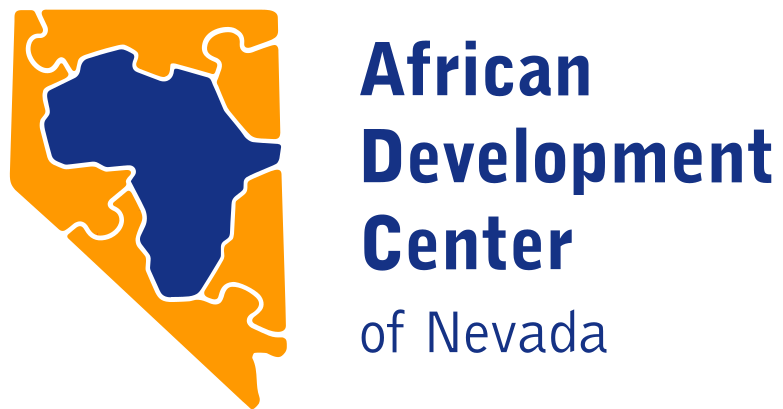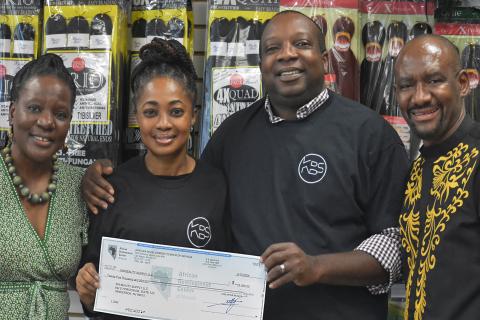
After decades working in the Los Angeles beauty industry, Esther Inwek, with her husband Utibe, sought new possibilities in Henderson, Nevada, a suburb of Las Vegas. When they arrived, Henderson was sparsely populated. To find hair and beauty products Esther needed for herself required a trip to Las Vegas of 30-40 minutes each way, while Las Vegas residents are only 10-15 minutes from a nearby beauty supply store. Her love for working in beauty and the absence of any beauty stores in the Henderson area seemed to present the perfect opportunity for someday opening one of their own.
Before that could happen, they worked for almost 4 years at other jobs saving money and getting the know the Nevada community they now called home. With a collective wealth of experience working in business between them, Esther and Utibe finally saw the opportunity to jump in and become owners of their own business (for the first time).
They were always clear in terms of what they wanted to offer their community. The store’s name, KIN Beauty Supply Store draws on the common meaning of “kin”—family. It also incorporates the initials from the names of their three children. In every respect, they want their customers to feel that they are with family when they are in the store. For the Inwek’s it’s much more operating than a retail business.
KIN is a store that was purposefully designed with a smaller footprint. Utilizing Esther’s expertise and broad product knowledge they offer a thoughtfully curated selection of hair and body care products that reflect the wants and needs of their community. The store’s design provides much easier customer experience than the big stores in Las Vegas where you need to walk aisle after aisle to find what you are looking for.
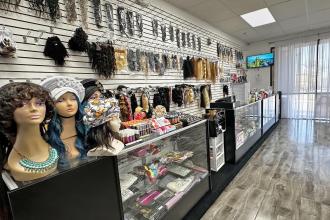
As a certified hair stylist and cosmetology instructor Esther provides personalized consultation about products while also scheduling appointments in their salon within the store. The warm, collaborative ambience in the store naturally leads to one on one conversations that support customers in finding what they really need—providing a special opportunity for customers to develop their own unique solutions for their beauty and personal care. Even if it requires ordering items not in the inventory from one of KIN’s many distributors, Esther and Utibe are ready and happy to help.
KIN is Black-owned and one of only a few minority-owned stores, especially beauty stores, in the immediate area. Their products appeal to and serve a multi ethnic community, matching products as diverse and unique as individual resident’s skin and hair. Esther is also knowledgeable about alternatives when customers have specific sensitivities that can be irritated by hair or body products.
Starting a business after a pandemic and a scam
The Inwek’s arrived in Henderson around the beginning of the Covid pandemic. So, people were not going out much and it took a couple of years before the previous level of social and commercial activity began to return.
Once they had made the financial and information-gathering preparations to move toward creating the business, they decided that finding expert help would be wise since they had never owned their own business before. Online research led them to a consulting firm that specialized in helping people set up retail beauty and personal care businesses. Esther and Utibe invested their savings in attending the academy offered by the consultants, and then to contracting the firm to design the store, purchase shelving and other furniture, set up the POS system, and supply the opening inventory.
After six months of waiting for the shelving and merchandise to arrive—and being told their supplies were on backorder—the opening date was approaching, the landlord needed to be paid—and the store was far from ready to open. And, the consulting firm had stopped taking and returning calls. The situation was critical.
But, the Inweks weren’t about to give up. So, they made a trip to Los Angeles where they have many colleagues and professional connections. There, with their savings gone, they purchased everything that the consulting company had not delivered—for a second time, on credit cards. They transported everything to Henderson and set the store up on their own.
The store opened in the middle of 2023 just as the effects of the Covid pandemic were showing real signs of tapering off. At the beginning, with limited connections in the community and limited resources they did their best to promote the business on their own. There was not a lot going on—because of Covid people had not been reaching out or gathering much.
Beginning to grow
It wasn’t until AFTER opening the store that Esther and Utibe learned about the vibrant African community in the Las Vegas metro area, including the nonprofit organization African Diaspora of Las Vegas (ADOLV). By chance, Utibe met one of ADOLV’s members and learned about the numbers of African people he and Esther were unaware of who were living nearby. The Inweks have since found it to be a very supportive community including popular family picnics, assorted public events, and networking connections. After having enjoyed such a community in LA, it was a welcome discovery following their first few years of relative isolation in Henderson.
Since opening KIN, word of mouth has been a significant contributor the store’s growth. Repeat customers are happy to have a beauty store nearby, they report that their needs are almost always met by the store’s offering, and they appreciate the warm and knowledgeable conversations that add value to their purchases. In turn, customers’ individual requests and suggestions have also contributed to the store’s success.
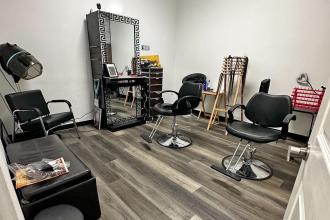
Henderson has begun to experience a significant influx of residents, expanding the audience for the products and beauty services KIN offers. Sales and revenue during 2024, the first full year in business, was steady and grew. With that trend Esther and Utibe saw the need to invest in advertising and additional merchandise, and to hire part time assistants occasionally in order to free up Esther to build her salon business. Naturally, such growth takes money.
But, corporate banks are looking for strong financial performance and a strong track record. Combining how the experience with the scamming consulting firm depleted their finances, their relatively short amount of time in business, and the effects of COVID, the business wasn’t yet in a “strong” position.
Getting it right with help from ADC
By chance, Utibe met Nasibu Sareva, the CEO of African Development Center of Minnesota (ADC) at a Las Vegas community event. ADC has a strong record of success in Minnesota, and was impressed by the energy and acumen of the people from Las Vegas that had reached out to bring ADC to their community. When Utibe and Nasibu first met, ADC was in the process of preparing to open a new office in Las Vegas. They carried on a conversation as ADC’s opening approached, and met occasionally when preparations brought Nasibu to town.
With small business development as one of the 3 core pillars of its mission, ADC was perfectly situated to partner with a business like KIN—in terms of resources, commitment and familiarity.
Utibe reports that, “The process with ADC was very straightforward and logical. I had been getting information from them for some time, and Nasibu had pointed me toward relevant content on the ADC Minnesota site—about resources they offer, common challenges, help that would be available, and the loan application process.”
KIN is the first Nevada company to go through he ADC loan process.
“What ADC has meant to us, and the community”, in Utibe’s words
The loan from ADC was a pleasant surprise. KIN was turned down for a traditional loan by their own bank, Utibe recalled, “They said, ‘Ah, you guys are still new.’ They said we had to be in business for 2-3 years before we could get any financing. Getting the loan from ADC under these circumstances was huge.”
The ADC loan helped establish a new level of stability and awareness for the business. For example the marquee sign was expensive and would have been unaffordable without the loan. It also required city permitting and other logistics with which Utibe and Esther had no past experience.
Utibe shared, “We only had the bare necessities before, when we opened. But, the sign has helped build traffic; before, many people didn’t even know we were here. The loan also enabled us to bring in more product inventory. It pumped new life into the business”.
He believes that having ADC in Las Vegas is not only great for the businesses, but also for the community. “There’s a lot of education that they (ADC) do for new businesses and new home owners. Before ADC there was word of mouth and you could network with others in the community. But, now there’s an office with experts where you can go. Having a place like that where people can go with their issues, it’s like speaking with family. It’s not like dealing with a corporate bank where no one is really listening to you”.
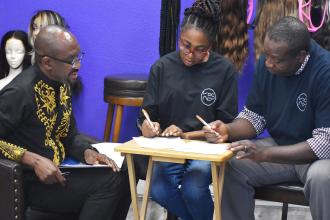
“Having a place like that (ADC)—where newer business owners can go as a starting point, for information, even though you’re not ready to start a business yet, you can plan ahead—(is invaluable). Otherwise, where can you go for help to get your questions answered, to hear about how other people have done things. Are you going to go to a bank? Like Chase Bank, who are you going to ask? You might just have random questions. You can feel more confident going to ADC, it’s much more comfortable for having those sorts of conversations. With them it’s not like you’re dealing with a big corporation. You don’t feel like you’re asking dumb questions. There’s a great comfort level dealing with ADC.”
“They really care about small businesses and the community, people who want to own a home. They understand that everyone is more than what you can see on paper. It’s not just, ‘How long have you been in business, how much do you know about finance?’ A lot of us are trying get those questions answered. They meet with you upfront and give you those answers. When you go to big businesses and banks they expect you to already have the answers to those questions.”
“ADC has such a level of caring that goes with their expertise.”
Finally, Utibe adds, “The more we go, the more we realize what we need to do to stay successful—advertising, diversifying products as more people find out about us, building awareness. It’s still a relatively new business. 2024 was our first full year. We’re still growing, and we like our trajectory. We definitely needed the boost—when we went with ADC we were recovering from the the whole initial scam we dealt with. Now we’re in the right upward part of the journey.”
